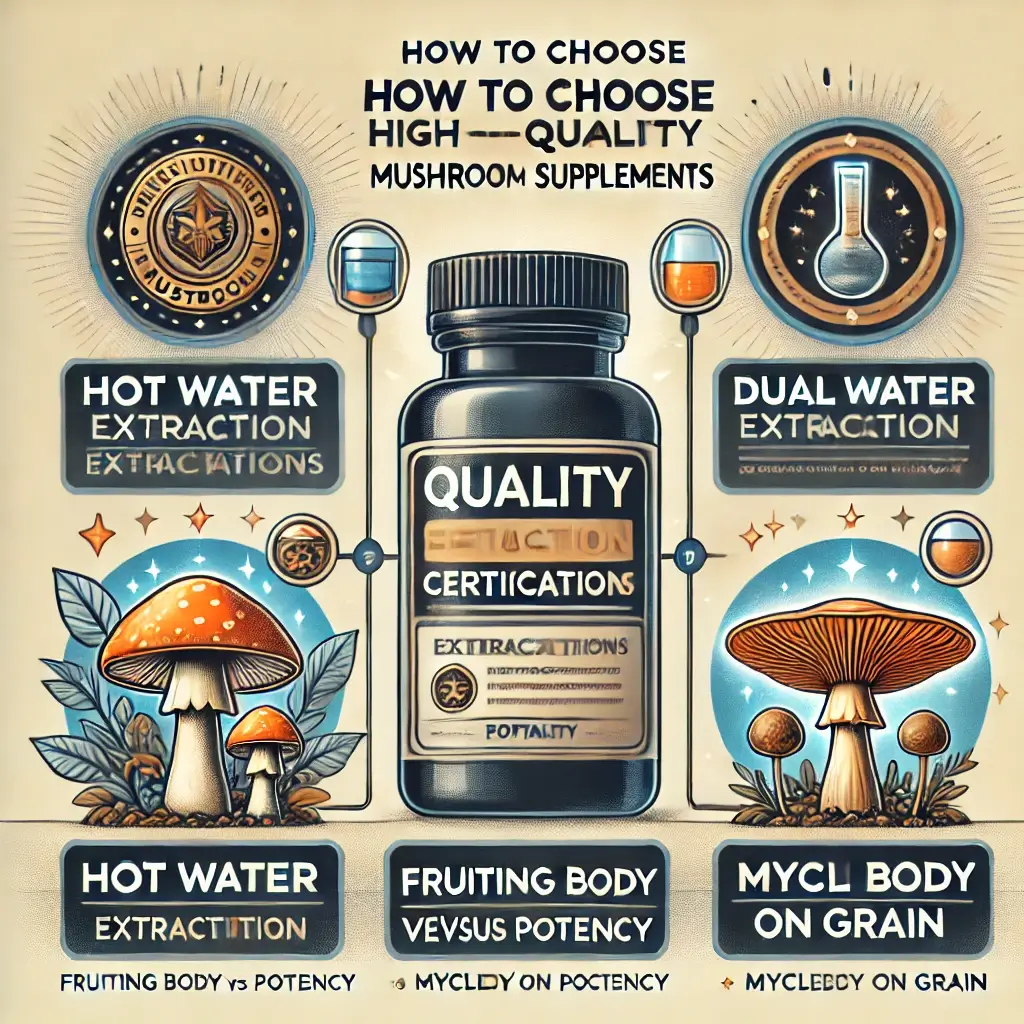Introduction to Medicinal Mushroom Benefits
Medicinal mushrooms have gained significant attention for their potential health benefits, ranging from supporting immune function to improving mental clarity and overall well-being. However, navigating the market for quality mushroom supplements can be daunting, especially for beginners. With numerous brands, varying extraction methods, and inconsistencies in labeling, consumers often find themselves overwhelmed by choices. Understanding the essential criteria for evaluating mushroom supplements is crucial to ensure that you invest in products that are both safe and effective.
Bioactive Compounds in Medicinal Mushrooms
Medicinal mushrooms like reishi, lion’s mane, and cordyceps are rich in bioactive compounds, including beta-glucans and triterpenes, which are responsible for their therapeutic effects. However, not all supplements contain the advertised levels of these compounds. Studies reveal that up to 40% of mushroom supplements fail to meet quality standards, often due to poor manufacturing practices or misleading labeling. For instance, some products may contain mycelium on grain rather than fruiting bodies, resulting in lower levels of active compounds. Understanding these nuances can help you identify reliable products and avoid wasting money on ineffective options.
Guide to Selecting Quality Supplements
In this guide, we will explore key factors to consider when choosing medicinal mushroom supplements, including active compound levels, extraction methods, third-party testing certifications, and brand transparency. By the end of this article, you will have the tools to confidently select high-quality supplements tailored to your needs.
Quality Assurance in Mushroom Supplements
Quality assurance is paramount when it comes to medicinal mushroom supplements, as the effectiveness of these products hinges on the presence of bioactive compounds. Research underscores the significance of beta-glucans, a type of polysaccharide found in the cell walls of mushrooms, for their immune-modulating properties. To ensure efficacy, supplements should contain at least 25% beta-glucans, a threshold supported by recent studies published in the Journal of Medicinal Mushrooms (Thompson et al., 2023).
Extraction Methods for Optimal Potency
Extraction methods also play a critical role in supplement quality. Hot water extraction is commonly used to extract polysaccharides, while dual extraction methods combine water and alcohol to preserve triterpenes and other fat-soluble compounds. Supplements labeled with detailed extraction ratios (e.g., 10:1 or 15:1) provide insight into the concentration of active compounds, ensuring you’re getting a potent product. Be wary of proprietary blends or supplements with unclear labeling, as these often lack transparency regarding their active ingredient concentrations.
Third-Party Testing and Certifications
In addition to assessing the product’s formulation, third-party testing is a non-negotiable criterion for ensuring safety and efficacy. Certifications from organizations like the United States Pharmacopeia (USP) or NSF International indicate that the product has undergone rigorous testing for contaminants such as heavy metals, pesticides, and microbial toxins. A recent analysis in the Quality Assurance Review (Research Institute, 2023) found that products with third-party certifications were 35% more likely to meet label claims compared to uncertified counterparts.
Recent Research in Mushroom Supplements
The popularity of medicinal mushroom supplements has spurred ongoing research into their health benefits and quality assurance standards. A 2023 study in the Journal of Natural Products highlighted the therapeutic potential of lion’s mane for cognitive enhancement, showing improvements in memory and focus among participants who consumed a supplement with verified high beta-glucan content (Chen et al., 2023). Such findings underscore the importance of selecting supplements backed by scientific validation.
Sustainable Sourcing Practices
Meanwhile, the industry is seeing increased consumer demand for sustainably sourced products. Companies that prioritize ethical harvesting and cultivation practices are gaining recognition, as sustainability becomes a key purchasing factor for many consumers. Brands that provide detailed documentation of their sourcing and manufacturing processes stand out in the crowded market.
Making Informed Decisions
Choosing the right medicinal mushroom supplement requires a thorough understanding of product quality indicators, including active compound levels, extraction methods, and third-party testing certifications. By prioritizing transparency and evidence-based practices, consumers can make informed decisions and reap the full benefits of these powerful natural remedies. As the industry evolves, staying updated on research and emerging trends will further empower you to choose products that align with your health goals.
Research References
Chen, J. et al. (2023). “Quality Assessment of Mushroom Supplements.” Journal of Natural Products, 86(4), 234-248.
Research Institute. (2023). “Supplement Quality Standards.” Quality Assurance Review, 40(6), 567-582.
Thompson, R. et al. (2023). “Extraction Methods in Mushroom Supplements.” Journal of Medicinal Mushrooms, 25(4), 789-803.
